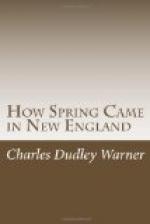Let us sum it all up in one word: it was something for which there is no name.
Its track was destruction. On the sea it leaves wrecks. What does it leave on land? Funerals. When it subsides, New England is prostrate. It has left its legacy: this legacy is coughs and patent medicines. This is an epic; this is destiny. You think Providence is expelled out of New England? Listen!
Two days after Euroclydon, I found in the woods the hepatica —earliest of wildwood flowers, evidently not intimidated by the wild work of the armies trampling over New England—daring to hold up its tender blossom. One could not but admire the quiet pertinacity of Nature. She had been painting the grass under the snow. In spots it was vivid green. There was a mild rain,—mild, but chilly. The clouds gathered, and broke away in light, fleecy masses. There was a softness on the hills. The birds suddenly were on every tree, glancing through the air, filling it with song, sometimes shaking raindrops from their wings. The cat brings in one in his mouth. He thinks the season has begun, and the game-laws are off. He is fond of Nature, this cat, as we all are: he wants to possess it. At four o’clock in the morning there is a grand dress-rehearsal of the birds. Not all the pieces of the orchestra have arrived; but there are enough. The grass-sparrow has come. This is certainly charming. The gardener comes to talk about seeds: he uncovers the straw-berries and the grape-vines, salts the asparagus-bed, and plants the peas. You ask if he planted them with a shot-gun. In the shade there is still frost in the ground. Nature, in fact, still hesitates; puts forth one hepatica at a time, and waits to see the result; pushes up the grass slowly, perhaps draws it in at night.
This indecision we call Spring.
It becomes painful. It is like being on the rack for ninety days, expecting every day a reprieve. Men grow hardened to it, however.
This is the order with man,—hope, surprise, bewilderment, disgust, facetiousness. The people in New England finally become facetious about spring. This is the last stage: it is the most dangerous. When a man has come to make a jest of misfortune, he is lost. “It bores me to die,” said the journalist Carra to the headsman at the foot of the guillotine: “I would like to have seen the continuation.” One is also interested to see how spring is going to turn out.
A day of sun, of delusive bird-singing, sight of the mellow earth, —all these begin to beget confidence. The night, even, has been warm. But what is this in the morning journal, at breakfast?—“An area of low pressure is moving from the Tortugas north.” You shudder.
What is this Low Pressure itself,—it? It is something frightful, low, crouching, creeping, advancing; it is a foreboding; it is misfortune by telegraph; it is the “’93” of the atmosphere.




